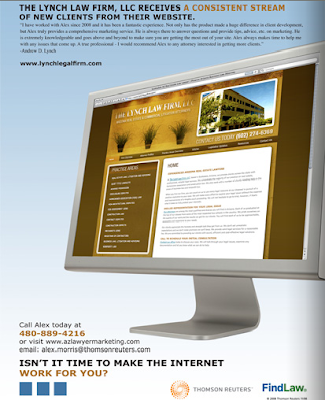As always, I feature a testimonial and website from one of my clients on the back cover. This month, Phoenix real estate attorney, Andrew Lynch was gracious enough to offer a very nice testimonial about his FindLaw experience.
In addition to the advertisement, I also supply an article on legal internet each month. My article this month dealt with the use of H1 headers. The H1 header is the first line of content on a web page. The selection of an H1 header can have important search engine and conversion consequences. I tackle both in this month’s article:
A website that works well reflects you and your law firm and is directed toward your potential clients. You know your firm and your market better than anyone else. At FindLaw, the company I represent, we have built thousands of legal websites. We have unparalleled experience with legal marketing on the Internet, but that does not substitute for your knowledge of your firm, your market and your clients.

Getting back to H1 headers: What is an H1 header? H1 is an HTML code that signals the search engines that this is what you can expect to find on this page. The H1 is typically the first copy on the web page – the first copy that a potential client sees.
In other words, the H1 has two purposes – signaling the search engine and informing the reader. In most cases, the same H1 copy can do both jobs well. If a page on a website is about DUI defense, “Phoenix DUI Defense Attorney” tells the reader and the search engine exactly that. The search engine knows to direct searchers to that page, and the reader knows he or she has reached the page requested.
Why would an SEM consultant suggest a specific H1 header when a general header would be more descriptive? The consultant is concerned with bringing search traffic to your website. In the case above, however, a specific header might send the reader off the site.
Specific headers are often not appropriate for the home page, firm overview or practice overview page of a website. A more effective H1 header would focus on conversion – attributes of the firm or concerns of the potential client, for example.The same considerations apply to other types of law firms. A personal injury firm that takes medical malpractice and negligent security cases would not want to be seen as only “Scottsdale Car Accident Lawyers” – even when the firm’s bread-and-butter cases are car accidents. The issue of H1 headers can be even more problematic for a general practice law firm. An H1 on the home page that announces “Mesa Estate Planning Lawyer” may well send a reader searching for a business formation attorney in Tempe off the site. (Yes, geographic terms can also be too specific and misleading in some cases.)
When the recommended H1 headers are, in your considered judgment, too limiting for your law firm and your potential clients, say no. Suggest or ask for an alternative that will more accurately describe what your law firm can offer the reader who comes to your website.
The most experienced search engine marketing consultants will tell you the same thing. They can recommend highly sought terms, but unless those terms work to convert a reader into someone who calls your firm, those are not the terms that will bring you business.
When you review the copy for your website, look at the H1 headers, the first words on the page, and read them as if you were looking for a lawyer. Don’t think about the search engines. Think about the reader and the impression you want that reader to have.
Search engines have the same purpose you have – to deliver the information the reader needs. A few years ago, search engines were less sophisticated. They could be misled by skillful (and even clumsy) keyword stuffing, the outdated practice of putting as many relevant keywords as possible in H1 headers and throughout the copy without regard to the reader experience.
As search engines have evolved and as readers have become more adept at using the Internet, heavy-handed tactics have lost whatever effectiveness they may have had. Search engine marketing consultants and copywriters work closely to assure keywords and messages are coherent and persuasive.
You are a lawyer, not an SEM consultant or copywriter. But as a lawyer, you are the final authority on what your firm does and the message you want to give prospective clients. If the H1 header does not send an accurate message or if the message is too limiting, say no.
If you would like to discuss search engine marketing or any other issues abut legal websites, you are always welcome to call me. I represent FindLaw, a Thomson Reuters business. Our SEM consultants, copywriters, designers and developers develop website for attorneys, and for no one else.

Alex, As usual you are right on the money with this article. I do the samething as you in St. Louis and have run into this problem with many new clients. My suggestion to my clients was to use Missouri Law Firm, St. Louis Lawyer, or Legal Assistance. I had a firm showing up very well for criminal but not for the other practice areas. Once we made the changes to the H1 tags they started showing up well for all practice areas. The original H1 tags were all criminal. They are very happy now. One other article you may want to write related to this issue is multiple practice firm websites and conversion. That same H1 header that caused a potential client to leave the website has another conversion bouncer which is lack of focus with two many practice areas. I have found in Missouri that divorce / family law conversion drops when the firm discussed hard core criminal topics on the same website. After splitting the two topics into focused websites the conversion on both sites went-up. Your thoughts would be appreciated. Thank you for writing this article.
Bill P. – FindLaw Senior Client Development Consultant